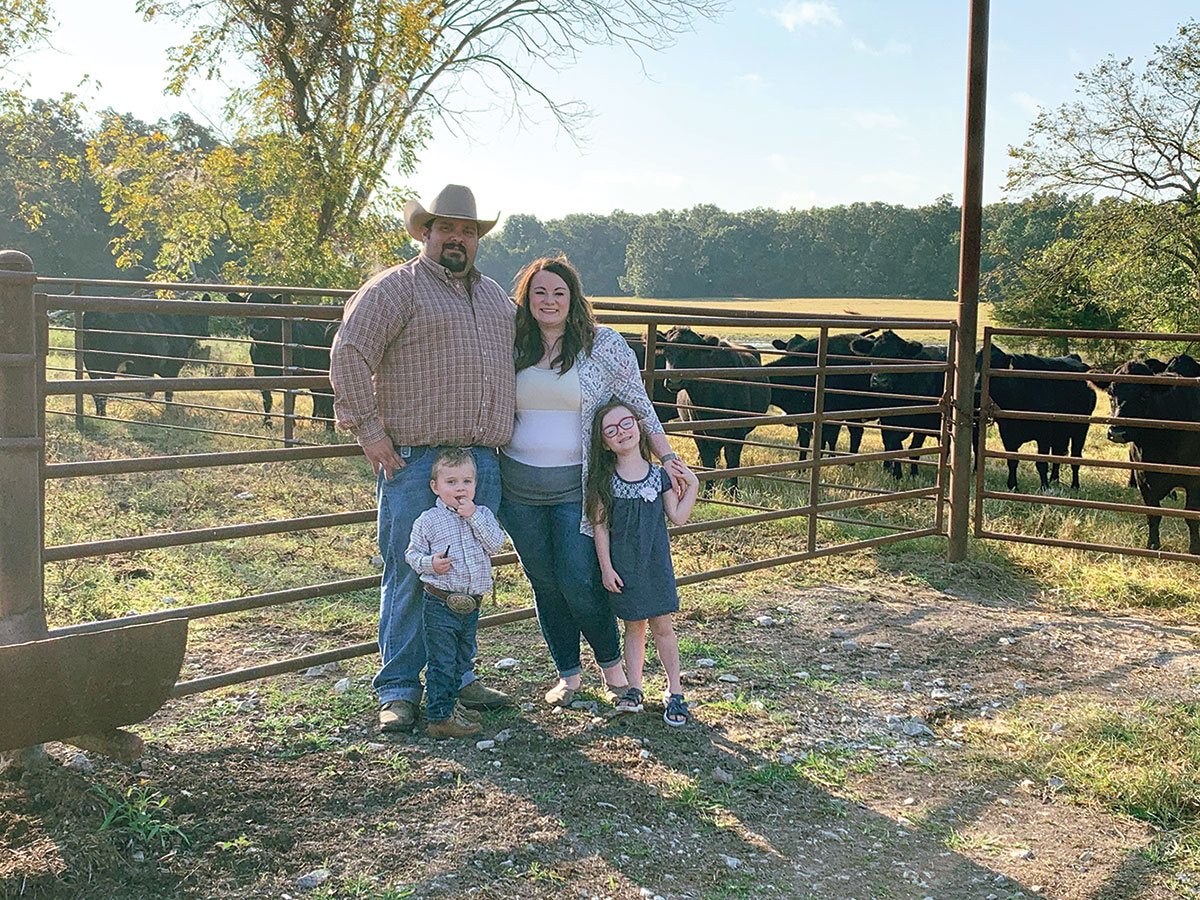You know, even when you give them the option of going in the barn, sometimes they just don’t want to,” Joe Prock, said, nodding towards his wife’s riding horse, Megan, who was covered in snow and ice, but looking quite content standing near her feed bunk and mineral block.
“If you give them enough protein, they can stand the cold. If they are out there in the cold, shivering, it is because of their diet,” he added.
“Horses are outside animals,” Karen, Joe’s wife, reiterated.
Joe and Karen Prock don’t baby their horses. “One of the biggest problems is when people try to make their horses too much like a pet,” Karen said.
Joe and Karen were high school sweethearts, but got married in 2000, almost 20 years after they met during the one year Joe attended school at Mountain Grove, Mo., where his paternal grandparents lived.
“The fates decreed we got back together,” he smiled. When Joe moved from Ruiduso, NM, to Missouri, he brought with him the experience of a lifetime in the equine industry. “My mom showed horses in Colorado all when I was growing up. My dad had farms, feeder cows and Quarter Horses out there.”
When the two first began discussing an equine breeding program, Karen had two Tennessee Walkers, one Paint, and one Quarter Horse. They have since got rid of everything except the Quarter Horse. “We did Paint breeding for awhile. We were even breeding our Quarter Horses to our our Paint stud. But then prices went from $900 a colt to $250 a colt. Then we realized it was time to retool the business. At that time we switched from Paints to cutting horses,” Joe explained.
The Prock’s now have cutting horses and foundation studs. The studs they will use to develop their breeding program have come from all across the U.S., from Texas, South Dakota, Illinois and Kansas. “We try to offer a variety of color and bloodlines to reach a bigger clientelle,” Joe said, adding, “We’re trying to stay vital. Studs from Smartest Little Prep, Smart Chich Olena and Smart Little Ricochet (whose granddaughter is pictured with Joe at right) bloodlines will be standing next year."
Joe and Karen both agree that proven genetic lines are essential to making horses that will be money-winners for their future owners. “Proven bloodlines, to us, are ones who are nationally recognized money winners,” Joe said.
“There are huge amounts of team penning and sorting around here. These are the types of horses we breed. People need quality horses from known money-earners to be successful in cow events,” Joe explained.
However, he is also trying to develop a niche market for his studs. “We will offer stud services for those weekend cowboys, the weekend sorters and penners. We want those in the area to be able to breed their mares to quality studs. We are trying to imporove the available studs in the area.”
The Procks determined that Quarter Horses are their preference when it comes to training and marking a breed for general intelligence.
“Generally, we’ve found Quarter Horses to be very intelligent, while paints are more pretty than extremely smart. It seems that paints have had a lot of intelligence bred out of them,” Joe added.
In addition to raising breeding stock, Joe trains horses, preparing them for riding or preparing them to be taken to the next level of cutting training, which he does not do himself. “Cutting trainers have to be pretty small, and I’m pretty large,” Joe joked. “No,” he said, “I’m just not a cutting expert, so I’ll start them and then take them to a professional to finish their training.”
Joe also has some customers who will bring in their horses in the spring, horses that haven’t been ridden all winter, to have him “settle them down.”
The initial training Joe puts on all his horses is simple. “Walk, whoa and stand for us is paramount. You don’t want to get on a horse that takes off and runs. If you say ‘whoa,’ it should stop,” he said.
Joe and Karen keep anywhere from 14 to 20 horses on their property at any given time. Joe has a 300 ft. arena bordered with PVC pipe woven in a circle, so the horeses won’t get hurt when they run into the side. He also has a 1/5 mile track, and a 40 ft. round pen on their 40 acres in Dallas County.
Nutrition is vital, and Joe weighs each of his horses, then uses a Missouri Extension website that gives him the ratio of grain to hay each of his horses need. The bred mares and growing colts get 3 lbs. of 16 percent dairy feed every day and 1 oz. of calf manna. Then also, everything gets about 10 lbs. of “the best hay we can get,” of alfalfa and timothy with 12 to 14 percent protein. Joe said he is also very precise with the 10 lbs. “Sometimes that means they get three flakes, sometimes that means two. But, I’ve found, it’s better to give a little more than less, especially in winter,” he added.
Joe is very in tune to his mares, and especially when they are foaling. “He’s very sensitive to mares and what they’re doing. They tell you if you’ll pay attention, and he does,” Karen noted.






